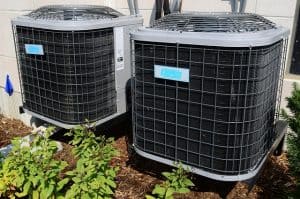Air conditioning (AC) systems have become essential to modern life, but not all systems are created equal. Some are simple and adequate for small spaces, while others are complex and designed to handle intricate demands in more extensive or specialized environments. If you’ve ever wondered about the inner workings of these advanced systems, this blog post will demystify them for you.

The Basics of Air Conditioning
At its core, an air conditioner removes heat and humidity from indoor air, cooling the space to a desired temperature. The process revolves around the principles of thermodynamics, using refrigerant—a substance that absorbs and releases heat efficiently. Typically, the system comprises four main parts: the evaporator, compressor, condenser, and expansion valve. Air is cooled as it passes through the evaporator, where the refrigerant absorbs heat.
The compressor then pressurizes this heated refrigerant, sending it to the condenser and releasing the heat outside. Finally, the expansion valve reduces the refrigerant’s pressure, cooling it further as it returns to the evaporator. The process of Air Handling Units or AHUs is similar, but they also include a fan to distribute cool air throughout the building. Despite this seemingly straightforward process, complex systems add layers of sophistication to improve efficiency, control, and adaptability.
Why Choose Complex AC Systems?
Complex AC systems are indispensable in commercial environments, large residential properties, and places with specific climate control requirements—like data centers or hospitals. Unlike basic units, these systems are designed for precision and offer enhanced control over temperature, humidity, and air purity. Efficiency is another crucial factor. Advanced systems often incorporate technologies that minimize energy consumption. Intelligent controls and zoned cooling ensure energy isn’t wasted on unoccupied spaces, optimizing comfort and utility.
Lastly, complex AC systems can integrate with other building management solutions, providing comprehensive environmental control. This level of integration supports a seamless transition between heating and cooling, adapting to changing needs with remarkable precision.
Critical Components of Complex AC Systems
Advanced AC systems might appear daunting due to their intricate components, but understanding these parts can provide insight into their capabilities. Each component enhances performance, making complex AC systems a smart choice for demanding environments. A few key elements differentiate complex systems from simpler units:
- Variable Refrigerant Flow (VRF): VRF technology allows precise temperature control in multiple zones. VRF units adjust the refrigerant flow based on demand, improving efficiency and comfort.
- Smart Thermostats and Sensors: These enable intelligent control over the system. By learning user preferences and responding to environmental changes, smart thermostats help maintain optimal conditions while conserving energy.
How Complex AC Systems Work
Although the fundamental principles remain the same, complex AC systems operate with advanced strategies to achieve superior performance.
- Zoning: Complex systems often feature zoning capabilities, where separate building areas can be heated or cooled independently. This means maintaining different temperatures in various rooms, maximizing comfort, and minimizing energy wastage.
- Heat Recovery: This feature allows systems to transfer heat from one area to another, which is applicable in climates with varying daily needs. For instance, heat extracted during the cooling process can be reused to warm other areas, improving energy efficiency.
- Inverter Technology: Compressors equipped with inverter technology can alter their speed based on cooling demand rather than cycling on and off. This ensures a more consistent temperature and reduces wear and tear on the system.

Mastering the mysteries of complex AC systems can significantly enhance your understanding of these crucial components of modern life. Whether you’re considering upgrading an existing system or installing a new one, the insights provided here aim to guide you toward optimal choices. Harness the power of complex AC systems to maintain comfort and functionality in your environment.






